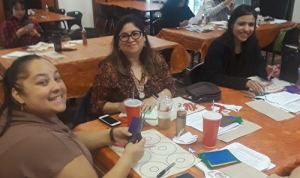Library Staff Learn Together Across Texas

Supercharged Storytimes is a continuing education course for public library staff on storytime planning and delivery that supports the development of early literacy skills in children while fostering caregiver and parent engagement. The Supercharged Storytimes course content includes a facilitator’s guide to promote group learning among peers, creating opportunities for idea sharing, community building, and accountability as participants collaborate each week. Learning in a group enriches a course experience, where participants collectively form bonds by developing a common subject language, sharing different perspectives, and supporting each other throughout the course to create a culture of lifelong learning.
Texas State Libraries Pilot Online Early Literacy Programming
Texas State Library and Archives Commission (TSLAC) saw the Supercharged Storytimes facilitated group-learning model as an opportunity to deliver continuing education in a new format. TSLAC Continuing Education staff Katherine Adelberg (Manager, Continuing Education and Consulting), Bethany Wilson (Youth Services Consultant), and Kyla Hunt (Library Management Consultant) piloted a statewide program that connected Texas storytime practitioners in a new online group-learning environment. For TSLAC staff, the goal with this pilot program "is to create an open space for participants to interact, learn from each other, and build those relationships to create a community of early literacy programming in Texas."
Across Texas, there are 549 main libraries and an additional 340 branch libraries dispersed across a vast geographic area. This can make it challenging for storytime practitioners—and particularly those in small and rural libraries—to connect with other librarians in their field. TSLAC used GoToMeeting and Google Docs to bridge this vast geographic divide by facilitating online group discussions. After completing a Supercharged Storytimes course module, participants listened to discussion questions delivered by TSLAC staff on a GoToMeeting call. Participants then responded to the prompts in a shared Google Doc. Using Google Docs as a communication vehicle allows participants to discuss prompts, pose their own questions, and actively engage with each other without talking over one another. The written document also creates a living record that can be referenced throughout the course.
The Supercharged Storytimes course is designed to promote sustained learning, applied practice, and reflection, which was difficult to accomplish through individual, face-to-face format training sessions across Texas. TSLAC’s new initiative to facilitate group learning online overcomes the challenge of distance to build capacity and cultivate a community of practice.
Supercharged Storytimes Collaboration Events
Peer learning proved such an enriching learning experience that TSLAC created Supercharged Storytimes Collaboration Events. At these Collaboration Events, storytime practitioners meet in person to revisit core course concepts, brainstorm storytime activities, and exchange ideas on challenging goals for early literacy programming, such as parent engagement. For example, at one of the Collaboration Events, a participant demonstrated how she incorporates Spanish into bilingual storytime activities. Following her presentation, the attendees asked her questions and exchanged information so that they could continue sharing ideas going forward. Other activities have included writing storytime songs and creating homemade toys.
Wilson explains that Collaboration Events provide sustained learning opportunities in Youth Services programming: "Rather than offering one-and-done programs, we want to build upon trainings and expand knowledge for our librarians in a collaborative, group-learning environment. The Supercharged Storytimes Collaboration Events accomplish this by reviewing the course material and creating a new way for librarians to engage with the curriculum and with one another."
Getting Started with Group Learning

Photo: Practitioners at Supercharged Storytimes Collaboration
Event in El Paso, used with permission from TSLAC
It can seem a tall order to use a facilitated learning model to deliver continuing education when looking to serve a large number of library staff, but TSLAC strongly emphasizes the benefits of such an approach. This model is something that can also serve regional systems or even a library system that is spread out geographically.
TSLAC has the following advice for others looking to start a similar initiative:
Be Intentional. TSLAC staff emphasize that it is important to have clearly defined and intentional goals for incorporating a facilitated group learning into programming.
Be Flexible. TSLAC has previously delivered their early literacy programming in a face-to-face training format; delivering continuing education online was out of their comfort zone. “Being open to change, however, meant that we could accomplish our goal to connect more libraries across Texas,” reflects Wilson.
TSLAC also emphasizes that flexibility is important for rich discussion experiences and encourages facilitators to resist the temptation to overly structure sessions. The most rewarding experiences, they reflected, unfolded when questions were clearly scaffolded to work toward more complex ideas while allowing plenty of time for open-ended discussion. "We quickly learned that flexibility is key to adapting learning experiences for what your audience needs," explains Adelberg.
This example from TSLAC of adapting and building on a WebJunction course to meet the needs of a specific audience is a powerful success story. All our materials are published under a Creative Commons license and are available for you to be flexible and make modifications that suit your learning community. Take some time and explore the free Supercharged Storytimes resources, including:
- Supercharged Storytimes Facilitator Guide
- General Facilitator Guide for learning together on any topic
- Supercharged Storytimes Self-paced Course
- Supercharged Storytimes Webinars
- Article on the benefits of group learning: Learning Together the Supercharged Way
